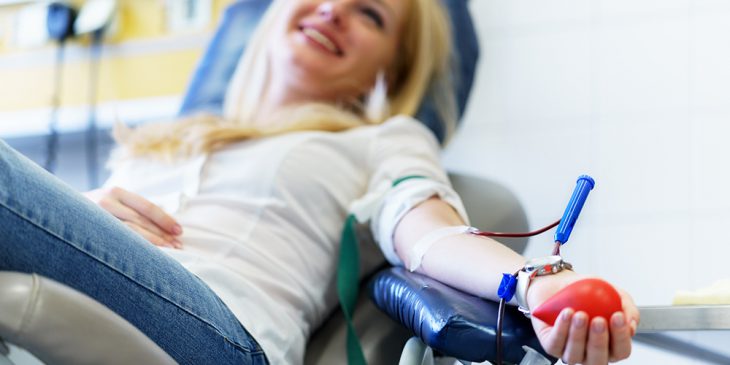Imagine going into work, doing your job like any normal week, but one day tripping over a power cord, resulting in the need for 10 pints of blood.
Debbie Meyers, a volume control representative for a natural gas company, went to work on a Wednesday not knowing her life would change forever. As she was walking to her desk, she tripped over a temporary power cord and hit the arm of her chair as she fell. Her co-workers rushed her to a nearby hospital where she was told she had bruised ribs.
“I remember just thinking how embarrassed I was that I tripped,” Meyers said. “I kept saying to myself, ‘I can’t believe I just did that.’”
Taking a few days off to relax and recuperate, Meyers was scheduled to go back to work the following Monday. But, she woke up earlier that morning with dizziness and pain in her side and called an ambulance.
“I don’t remember a lot after that,” Meyers said. “I was rushed back to the emergency room, where I found out I had a ruptured spleen. I had been bleeding internally for five days. I had an emergency splenectomy and received 10 pints of blood during the operation.”
Because of complications with her breathing, Meyers was transported by helicopter to UPMC Mercy, where she was put on a respirator for five days. When she was released from the hospital nine days later, she wanted to make sure people knew the importance of donating blood because in the end, it was the generosity of blood donors that saved her life.
“It’s hard to imagine that because 10 people were willing to each donate one pint of blood, I am alive today.” Meyers said. “There is no way for me to personally thank those 10 strangers for their gift of life, but what I can do is pay it forward by donating my own blood and continuing to share and tell my story.”
Blood donations have decreased by 50% in the past 10 years, according to Vitalant, the blood product provider for UPMC. In 2017, donors in western Pennsylvania gave 47% of the blood needed by area hospital, forcing Vitalant to import the other 53% from blood centers outside the area.
“We are calling on people across our region to make donating blood a lifelong habit,” said Dr. Darrell Triulzi, director of the Division of Transfusion Medicine in the UPMC Department of Pathology. “Giving blood on a regular basis will help ensure hospitals have enough blood to treat patients with cancer and other diseases, to perform elective and emergency surgeries, and to help save the lives of our neighbors.”
Every time a person donates, he or she can save up to three lives. At UPMC, if an employee donates blood three times during the year, he or she is eligible to receive one PTO day.
For or more information about donating blood or to find an upcoming blood donation opportunity, click here.









